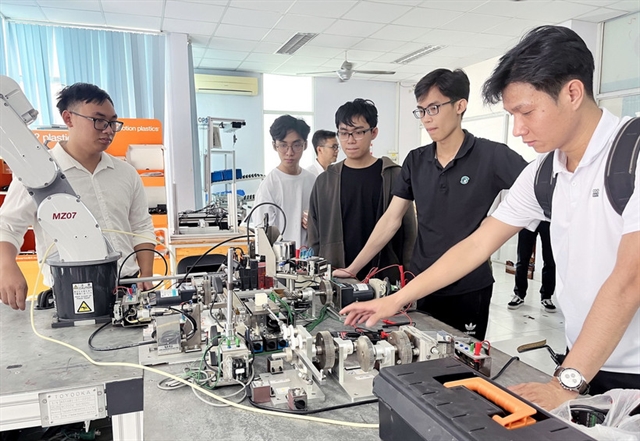Việt Nam still lacks a robust methodology and practical frameworks to steer real-world adoption and the skills gap is the bottleneck, said speakers at a conference on AI development.

HÀ NỘI – From buzzword to backbone, artificial intelligence (AI) and data are fast becoming the twin pillars of national competitiveness. Việt Nam must craft a clear national strategy and a unified data-architecture framework, with AI training for leaders, specialists and the wider workforce, to ensure deployment is safe, effective and genuinely transformative.
This was highlighted by researchers and government representatives at the seminar 'AI Strategy and Data Architecture at National, Organisational and Enterprise Levels' (ASDA 1), held in Hà Nội on Wednesday by the Institute for Generative Intelligence Technology and Education (IGNITE), the National Data Association (NDA), Hanoi Radio & Television and partners, with more than 100 participants from government, academia and industry.
Speakers agreed AI is now permeating production, business and public administration, but warned that data governance and strategic direction alone are not enough without people capable of executing them. Việt Nam still lacks a robust methodology and practical frameworks to drive real-world adoption, with the skills gap emerging as the most pressing bottleneck.
Associate Professor Dr Nguyễn Ái Việt, Director of IGNITE, noted that more than 70 per cent of domestic tech firms are already exploring AI and that the Government aims for Việt Nam to be an ASEAN AI innovation hub by 2030. To reach that goal, a national data strategy and architecture must be matched by a national AI-training push: executive programmes for decision-makers, practitioner pathways for engineers and data professionals and foundational AI literacy for civil servants and SMEs.
Fragmented data remains a structural challenge. Director of the National Data Centre and NDA Vice President Nguyễn Ngọc Cương called for a unified data-governance system across four pillars — institutions, technology, processes and people. Clarifying ownership, use and sharing; building nationwide data infrastructure; standardising collection, processing and exchange — all require trained talent: data stewards, privacy officers, MLOps engineers, security specialists and domain experts who can translate policy into practice.
Designing architectures on a national reference framework, NDA Deputy Secretary-General Nguyễn Thị Tuyết Nhung stressed 'by-design' integration of AI and automation into end-to-end business processes, with safety, security and privacy first. That integration depends on targeted training: secure model development, evaluation and monitoring; red-teaming and risk management; and sector-specific implementation in healthcare, finance, education and public services.
Many speakers urged fast-tracking an AI law to enable safe development.
Director of the National Institute for Digital Technology and Digital Transformation (Ministry of Science and Technology) Dr Hồ Đức Thắng said a national AI strategy and an AI law must move in tandem. Training is the bridge between the two — translating legal principles into day-to-day practice through certification, continuous professional development and shared toolkits for compliance, auditability and human-centred design.
The Law on the Digital Technology Industry (2025) recognises data as a new factor of production and AI as a new mode of production.
Vice Chairman of the National Assembly’s Committee on Science, Technology and Environment Dr Trần Văn Khải argued existing legislation does not yet cover AI-specific issues and called for an early AI law to manage risk and protect citizens. Training again is decisive: regulators, auditors and ethics committees will need the capabilities to interpret and enforce new rules; organisations will need the skills to comply without stifling innovation. VNS





